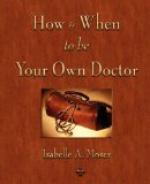than usual. The standard of resistance may be
opposed so strenuously by habits and unusual physical
agencies—that the body breaks down under
the strain. This is a crisis. Appetite fails,
discomfort or pain forces rest, and, as a result of
physiological rest (fasting) and physical rest (rest
from daily work and habits), a readjustment takes place,
and the patient is “cured.” This is
what the profession and the people call a cure, and
it is for the time being—until an unusual
enervation is brought on from accident or dissipation;
then another crisis. These crises are the ordinary
sickness of all communities— all catalogued
diseases. When the cold is gone or the hay-fever
fully relieved, it does not mean the patient is cured.
Indeed, he is as much diseased as before he suffered
the attack—the crisis—and he
never will be cured until the habits of life that keep
up toxin poisoning are corrected. To recover from
a crisis is not a cure; the tendency is back to the
individual standard; hence all crises are self-limited,
unless nature by maltreatment is prevented from reacting.
All so-called healing systems ride to glory on the
backs of self-limited crises, and the self-deluded
doctors and their credulous clients, believe, when
the crises are past, that a cure has been wrought,
whereas the real truth is that the treatment may have
delayed reaction. This is largely true of anything
that has been done except rest. A cure consists
in changing the manner of living to such a rational
standard that full resistance and a balanced metabolism
is established. I suppose it is not quite human
to expect those of a standardized school of healing
to give utterance to discovered truth which, if accepted
by the people, would rob them of the glory of being
curers of disease. Indeed, nature, and nature
only, cures; and as for crises, they come and go,
whether or not there is a doctor or healer within a
thousand miles.
Dr. John. H. Tilden, Impaired
Health: Its Cause and Cure, 1921.
The accelerated healing process that occurs during
fasting can scarcely be believed by a person who has
not fasted. No matter how gifted the writer,
the experiential reality of fasting cannot be communicated.
The great novelist Upton Sinclair wrote a book about
fasting and it failed to convince the multitudes.
But once a person has fasted long enough to be certain
of what their own body can do to fix itself, they
acquire a degree of independence little known today.
Many of those experienced with fasting no longer dread
being without health insurance and feel far less need
for a doctor or of having a regular checkup.
They know with certainty that if something degenerates
in their body, their own body can fix it by itself.
Like Upton Sinclair and many others who largely failed
before me, I am going to try to convince you of the
virtues of fasting by urging you to try fasting yourself.
If you will but try you will be changed for the better
for the rest of your life. If you do not try,
you will never Know.




